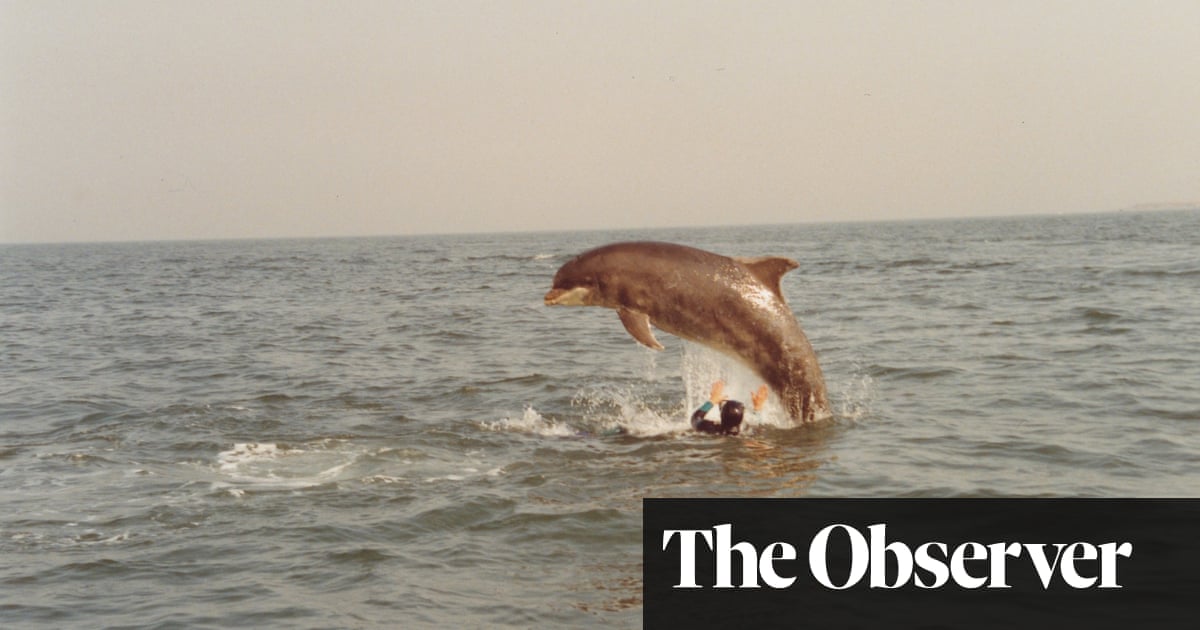
Hooked on Freddie Wondery
Case 63 (Gimlet, FortySixty and Mad Gene Media) | Spotify
Absolute Radio | planetradio.co.uk
Here’s a real-life cold-case story told by the people involved, with a host who goes back to a place they knew well when they were younger to uncover details of a possible miscarriage of justice. Sounds fairly run of the mill, you’re thinking. Nothing we haven’t heard before. Well, I’m here to inform you that Hooked on Freddie is different. Sure, it uses familiar true crime podcast techniques to tell its tale – but that tale is exceptional.
In 1987 something truly special happened to Amble, a tired coastal town just north of Morpeth in Northumberland. A wild dolphin decided to visit. And to stay (there were a lot of salmon in Amble’s harbour). Locals were enchanted, schoolchildren called him Freddie, several people swam with him and tourists started arriving.
One of these visitors was Alan Cooper, an animal rights activist from Manchester who became one of Freddie’s most constant in-water companions, and who appears in Hooked on Freddie. Another was Becky Milligan, a then rookie journalist, who is our host. (Her recordings from the time are included, and when she goes in the water to meet Freddie, she sounds a little nervous, understandably.) A third was Peter Bloom, owner of Flamingo Land, a North Yorkshire theme park that featured three trained dolphins doing tricks. He, too, appears throughout this six-part series.
I’m not going to spoil the entire story but Cooper and Bloom don’t get on, then or now (Cooper is very against trained dolphins; Bloom thinks Cooper shouldn’t be messing with a wild one). One day in 1990, Cooper is in the North Sea, swimming with Freddie, as he did every weekend, when a boat approaches with people on it who seem to be observing them. Cooper thinks that one of them is Bloom. And soon afterwards, Cooper is accused by police of performing what used to be called an “unnatural act” on Freddie…
You’re hooked too now, aren’t you? It sounds hilarious, right? Well, what makes Hooked on Freddie so great is that, actually, this story isn’t funny at all. Milligan takes Cooper’s prosecution and subsequent humiliation seriously, and shows us how his life is destroyed. She also lets Bloom give his side of the story. But she does this within the punchy setup of a true crime series, this seemingly slight narrative given status and warmth through great reporting and dramatic dynamics. Milligan’s script, written as though for a political scandal or a serial murder case, keeps Hooked on Freddie fun, but devastatingly human.
Case 63, the excellent and hugely successful drama series is – be still my beating heart! – back for a second series. The first, adapted from the smash-hit Chilean podcast Caso 63, remains one of the best podcast dramas you’re likely to hear. Featuring Julianne Moore and Oscar Isaac, Case 63’s complicated Arrival/Interstellar-style plot in series one was gripping and exciting. Plus, the chemistry between Moore and Isaac was steeeeeamy. All this mixed with a fantastic use of audio: what initially seemed like conversational slip-ups were revealed to be deliberate and crucial to the plot and made you want to listen to the whole thing again, as soon as you’d finished it.
And, actually, I would recommend that you relisten to the first series before you start the second – unless your memory is better than mine. Case 63: Season 2 begins exactly where series one finished (on a massive plot twist), in a bathroom at an airport, with Moore’s Beatrix Knight in a thoroughgoing, time-travelling pickle. We bang straight into the action and it’s breathless from here on in, as well as pleasingly reminiscent of season one. It’s not quite as good as the first series – there’s more on-the-nose explanation of time travel and what needs to be done to rescue the world – but you know the very best Doctor Who episodes, the ones with save-the-planet urgency and mind-boggling time slippage and scary memory erasion and, yes, love? Case 63 has all of these things, but makes them grownup and sexy.
Absolute Radio was 15 in September, which may not seem a big deal to those who don’t listen (or, indeed, to those who do), but is a highly creditable achievement. It’s hard to ensure a commercial station has a brand that’s strong enough to register with the public but also move with the times, and Absolute has managed it – partly through its radical idea of creating stations for particular eras. Absolute and its spin-off stations 60s, 70s, 80s, 90s, 00s and 10s all have the same presenters for the headline shows but play different songs: a technically tricky idea that has worked very well.
A few birthday shoutouts: first up, weekday breakfast show host Dave Berry. Listening to his show over the past couple of weeks has been a delight: Berry manages to bring in the listeners without in any way belittling them. His interviews with famous people are flat-out hilarious; the features are funny and imaginative (there’s an enormous Absolute birthday card now travelling round the country for listeners to sign); and the whole show, even though it features an on-air “crew”, doesn’t feel like anyone’s shouting at you or excluding you from their club. I laughed out loud when he read out a text sent by mistake to the show: “Cheese carrots shepherds pie mix onion pasta sauce… you might want to resend that text to the person who needs it.”
Aside from Berry, weekend presenters such as Alex Kapranos, Skin (from Skunk Anansie) and Tim Burgess give credibility; and Frank Skinner hosts a whimsical Saturday morning show too. Commercial radio often causes a sniffy reaction among reviewers: Absolute shows that it’s just snobbery.












